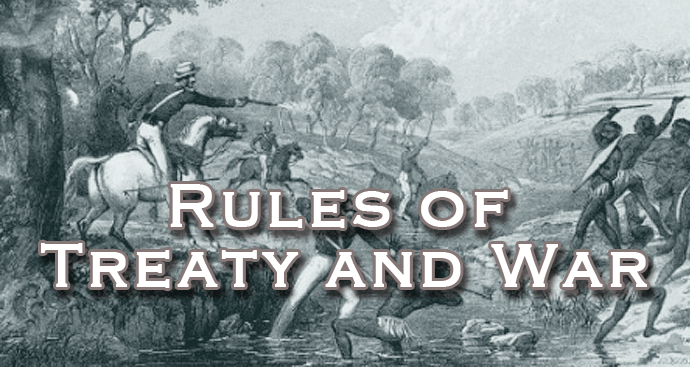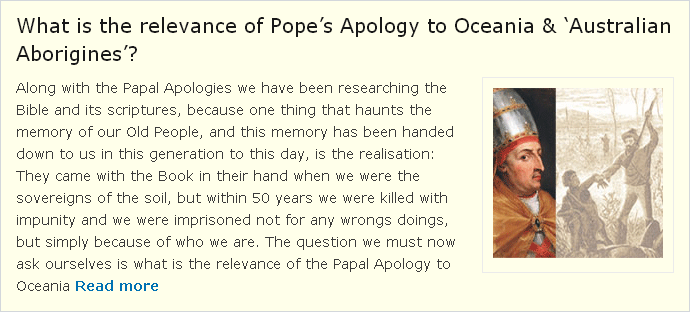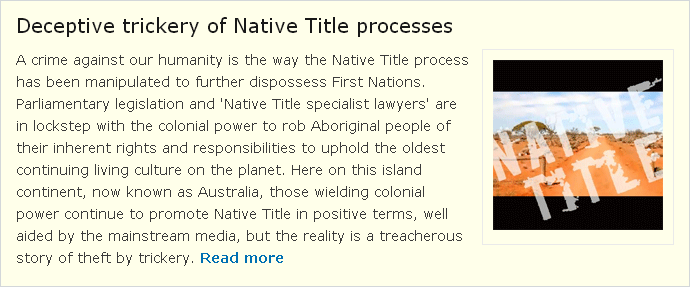No treaty or contract is valid if the parties are at war


Ghillar, Michael Anderson 13 November 2018
The key rights that we have as First Nations Peoples of this continent are now supported by international laws and developing international customary legal norms, for example, as collated in Human Rights at Your Fingertips (pdf) published by the Federal Attorney-General's department.
One international legal norm is the progressive recognition of redress for past wrongdoings perpetrated by ambitious French, Portuguese, English, Dutch, Spanish and German colonialists.
What is interesting, however, is understanding that the Pope in Rome was instrumental in instigating invasions of other countries. In order to settle the Spanish, Portuguese, French and English wars across the English Channel/La Manche, the key warring parties had to find a third party to mediate an end to their violent clashes against each other in the 1400s and 1500s. History shows that they turned to God's representative on earth, the Pope, seen as the 'divine ruler'.
It should be remembered that during the internal wars over land titles in England, the key players also turned to God's representative, the Pope (Innocent III) and his 'disciples', and that to break the tyranny of King John of England, it was a Catholic Archbishop of Canterbury, Stephen Langton, who drafted the Magna Carta that King John agreed to on 15 June 1215.
Having mediated European struggles over land and resources, the Pope then issued new decrees which divided the world up for the warring parties to rape, pillage and plunder in order to end the wars in Europe. Thus began the flow of Papal Bulls (seals) whereby an order of the Pope, supposedly representing the biblical Judeo-Christian God on earth, divided the world up for kingdoms such as Portugal, Spain, England and France to invade under the Doctrine of Discovery, which became deeply entrenched. This alleged Christian right to usurp the lands and the usufructuary rights of the native inhabitants, 'pagans' and 'infidels' was decreed in The Bull Romanus Pontifex (Nicholas V), January 8, 1455 and The Bull Inter Caetera (Alexander VI), May 4, 1493 which instructed the invaders to 'overthrow' and 'vanquish' 'barbarous' nations, 'and all other infidels whatsoever' and 'enemies of Christ wheresoever placed' and 'subdue certain gentile or pagan peoples living between, who are entirely free from infection by the sect of the most impious Mahomet and to preach and cause to be preached to them the unknown most sacred name of Christ'. In order 'more zealously to pursue this most pious and noble work' 'to conserve their right and possession' it is 'supported by the Apostolic See with favors and graces'. The 'Christian rule' acquired 'by the right of conquest' 'from the lands of infidels or pagans' 'all those provinces, islands, harbours, and seas whatsoever'. First Nations Peoples were also decreed to remain unarmed by preventing trade in 'iron instruments, wood to be used for construction, cordage, ships and any kinds of armor'.1
The Doctrine of Discovery had its origin in the biblical text, which was articulated by the Papacy in Rome and circulated as supreme authority by the Papal Bulls. These Judeo-Christian decrees were the basis for the right of 'First Discoverers' to plunder and enslave, and in so doing asserted that the word of God had superior force over pre-existing claims and right of occupation.
Therefore, the zealous taking of lands during the imperial colonial expansion was promoted as a God-given right. The justification was that lands would be classified as terra nullius (nobody's land), and uncivilised, if populated by those who did not believe in Jesus Christ or an equivalent.
Then comes the Mabo High Court case in 1992. Limited though the questions were, the High Court took a giant step to firstly overturn existing legal precedents and to recognise the continuing proprietary interests and usufruct rights of the First Nations Peoples in Australia. But the conviction of those who made the decision was counteracted by their cowardice in refusing to recognise the decision of Chief Justice Willis in the NSW Supreme Court case R v Bonjon 1841, in which Willis held that the colonists are the intruders and Aboriginal Peoples are the 'sovereigns of the soil'. Willis CJ is also reported as ruling:
But the frequent conflicts that have occurred between the colonists and the Aborigines within the limits of the colony of New South Wales make it, I think, sufficiently manifest that the Aboriginal tribes are neither a conquered people, nor have tacitly acquiesced in the supremacy of the settlers.
I repeat that I am not aware of any express enactment or treaty subjecting the Aborigines of this colony to the English colonial law, and I have shown that the Aborigines cannot be considered as Foreigners in a Kingdom which is their own.
This cowardice of the High Court judges that I speak of, is where the High Court realised that they were between a rock and a hard place with the Mabo case. At paragraph 29 they lamented:
It is not possible, a priori, to distinguish between cases that express a skeletal principle and those which do not
In other words, had the High Court known where this case would lead, they may not have agreed to hear the case in the first place.
So the judges in Mabo had to stretch a very long bow when they ruled that Australia was 'settled' on an ancient English legal foundation, which was the feudal land system. The irony of this decision falls into two categories:
- the concept of terra nullius (or land belonging to no-one)
- the law of feudalism and its legal impacts which are null and void, because feudalism disappeared from the English legal system in 1660.
In order to justify the alleged Crown Land ownership in Australia, the High Court resurrected a non-existent ancient land law system belonging to Britain, while feudalism has no legal authority in common law anywhere in the world, except in Australia.

In order to justify the alleged Crown Land ownership in Australia, the High Court resurrected a non-existent ancient land law system belonging to Britain, while feudalism has no legal authority in common law anywhere in the world, except in Australia.
The end of feudalism in England, permitted private ownership of land throughout the United Kingdom and destroyed the King's or Queen's right to own all the land. But by the High Court ruling that land tenure in Australia is based on feudalism, the judges could find that the king came and claimed all the land as his. This ties in with Governor Darling denouncing the Batman Treaty in Victoria, because no other person but the king could sign away land.
The related legal question is: Does 'feudalism' have any legal validity today?
Like the justices of the High Court, lawyers who are committed to the Bar and the Bar Association of Australia, are just big cowards and fear challenging what needs to be challenged and what is justly correct. This cowardice is represented by the lawyers following black letter law, e.g. in the Native Title Act. Don't rock the boat!
The question that we, as First Nations People, must ask next is: Are we happy with the current situation and, if not, what is our next move?
Having asked this question, I put it to all our First Nations Peoples, who are proposing to come to our Gathering of Nations to give thought to the following:
In Native Title applications, the question that the lawyers ask the applicant group is: 'Do you have the ability to prove your connection to Country under your Law and customs at the time of 'British Sovereignty'. (N.B. should state alleged British Sovereignty).
If we are to prove our connection to Country at the time of alleged 'British Sovereignty', we need to go back to Justice Willis's New South Wales Supreme Court decision in R v Bonjon 1841, which has never been overturned. The High Court in Mabo indirectly observed R v Bonjon 1841 (without it being mentioned) by ruling that our proprietary law rights have their authoritative origins in our own pre-existing and continuing Law and customs. As the Mabo decision ruled at paragraph 65, these rights under our Law and custom are inalienable and no foreign parliament, such as Australia and its federated States and its two mainland Territories, have the legal capacity to take them from us:
65. Native title, though recognized by the common law, is not an institution of the common law and is not alienable by the common law.
In other words, the High Court in Mabo ruled that they are inalienable rights and that the Commonwealth Parliament and its State and Territory counterparts cannot legislate to take them away, because they are inherent sovereign rights that belong to another authoritative jurisdiction, independent of the colonial occupying power. This is why the expert on the Australian Constitution, Professor George Williams, says Aboriginal people need not ask for sovereignty, they should simply assert it under their Law and customs.
So, the next question is: How does the Australian authority maintain its power over us? The answer is very simple. What gives this answer its fluency and authority comes from the Orders issued to Governor Phillip, in which the Colonial Secretary's Office and the British Admiralty, now known as the War Office, instructed him on 12 August 1786 to apply the 'rules and disciplines of war' when establishing the colony of New South Wales:
you are to observe and follow such orders and directions from time to time as you shall receive from us, or any other of your superior officers according to the Rules and Disciplines of War ... 2
There is no evidence that this lawful instruction from England was ever repealed and the history of Australia thereafter clearly demonstrates that the State police are used as their military wing to crush Aboriginal resistance, which is made to look like acts of civil disobedience that is dealt with under the criminal law. Conversely, the Howard government did use the military to enforce the Northern Territory Intervention.
Politicians, through their propaganda and electioneering, argue for and on behalf of the public that 'law and order' is a key policy objective, but the electorate does not realise that the act of war is being perpetrated against our First Nations Peoples and is written into these pretended 'law and order' control mechanisms. This is evidenced by the fact that First Nations people sit in jails around this country in large numbers, including our youth and children, for alleged offences that non-First Nations People would never go to jail for. The colonial administrators argue this when they use the term 'recidivism' (the tendency of a convicted person to reoffend) and they catch our people in these nets of incarceration with the three-strike rule principle and 'paperless arrests', but these only apply to First Nations people, because this is who they are targeting.
The Native Title Act is in itself a law that attacks our inherent rights and, in fact, diminishes these rights to a point where they no longer exist. In short, this is yet again another act of war against First Nations Peoples.
It therefore follows under international law and domestic contractual law-no treaty or contract can be classified as legal if we are under the 'rules and disciplines of war'.
It further follows that, if our First Nations Peoples are not fully aware of these facts, then any contract entered into, treaty or otherwise, can be argued to be invalid.
These and other issues must be addressed if we are to get the justice due to us.
It is imperative that we as First Nations People know all the wrongdoings, so as to ensure that we have a clear understanding of our legal rights now and going forward.
We will be making the call, not the colonists.
Our rights, our future - never forget it.
 Contact: Ghillar Michael Anderson
Contact: Ghillar Michael AndersonConvenor of the Sovereign Union,
Head of State of the Euahlayi Peoples Republic
Contact Details here
2.Historical Records of Australia vol. 1, Series 1, p. 1.



